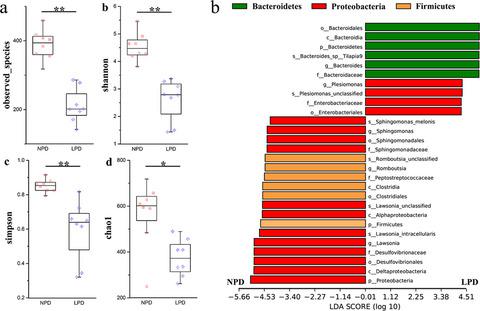当前位置:
X-MOL 学术
›
Microbiologyopen
›
论文详情
Our official English website, www.x-mol.net, welcomes your
feedback! (Note: you will need to create a separate account there.)
Physiological and gut microbiome changes associated with low dietary protein level in genetically improved farmed tilapia (GIFT, Oreochromis niloticus) determined by 16S rRNA sequence analysis.
MicrobiologyOpen ( IF 3.9 ) Pub Date : 2020-03-16 , DOI: 10.1002/mbo3.1000 Hao-Jun Zhu 1, 2 , Jun Qiang 2 , Yi-Fan Tao 1, 2 , Tlou Kevin Ngoepe 1, 2 , Jing-Wen Bao 2 , De-Ju Chen 1, 2 , Pao Xu 1, 2
MicrobiologyOpen ( IF 3.9 ) Pub Date : 2020-03-16 , DOI: 10.1002/mbo3.1000 Hao-Jun Zhu 1, 2 , Jun Qiang 2 , Yi-Fan Tao 1, 2 , Tlou Kevin Ngoepe 1, 2 , Jing-Wen Bao 2 , De-Ju Chen 1, 2 , Pao Xu 1, 2
Affiliation

|
The aim of this study was to determine the effects of different dietary protein levels on the growth, physiological parameters, and gut microbiome of genetically improved farmed tilapia (GIFT, Oreochromis niloticus). Two pellet feed diets with low (25%, LPD) and normal (35%, NPD) protein levels were fed to GIFT in aquaria at 28°C for 8 weeks. The LPD reduced trypsin activity and inhibited the growth of GIFT. The serum alanine amino transferase and aspartate transaminase activities, hepatic malondialdehyde content, and superoxide dismutase, glutathione peroxidase, and catalase activities were significantly higher in LPD GIFT than in NPD GIFT (p < .05). The LPD led to decreased lysozyme activity and increased levels of C3 (p < .05). A 16S rRNA gene profiling analysis showed that the LPD significantly affected the gut microbial composition. Compared with the NPD, the LPD significantly decreased intestinal microbial diversity (p < .05). The macronutrient distribution affected the taxonomic profile of gut bacteria, mainly the phyla Bacteroidetes, Proteobacteria, and Firmicutes. The LPD favored growth of the genus Bacteroides. The NPD appeared to increase the abundance of the genera Lawsonia, Romboutsia, and Sphingomonas. Our results showed that, compared with NPD GIFT, the LPD GIFT had weakened nonspecific immune function, altered microbial community structure, and decreased gut microbial diversity.
中文翻译:

通过16S rRNA序列分析确定了遗传改良养殖罗非鱼(GIFT,尼罗罗非鱼)中与低饮食蛋白质水平相关的生理和肠道微生物组变化。
这项研究的目的是确定不同饮食蛋白水平对转基因罗非鱼(GIFT,Oreochromis niloticus)的生长,生理参数和肠道微生物组的影响。将两种蛋白质含量低(25%,LPD)和正常(35%,NPD)的颗粒饲料在28℃的水族箱中喂入GIFT 8周。LPD降低了胰蛋白酶的活性并抑制了GIFT的生长。LPD GIFT的血清丙氨酸氨基转移酶和天冬氨酸转氨酶活性,肝丙二醛含量,超氧化物歧化酶,谷胱甘肽过氧化物酶和过氧化氢酶活性显着高于NPD GIFT(p <.05)。LPD导致溶菌酶活性降低和C3(p <.05)。16S rRNA基因谱分析表明,LPD显着影响肠道微生物组成。与NPD相比,LPD显着降低了肠道微生物多样性(p <.05)。常量营养分布的影响肠道细菌的分类概况,主要门类拟杆菌,变形菌,而厚壁菌门。LPD有利于拟杆菌属的生长。NPD似乎增加了Lawsonia,Romboutsia和Sphingomonas属的丰度。我们的结果表明,与NPD GIFT相比,LPD GIFT减弱了非特异性免疫功能,改变了微生物群落结构,并降低了肠道微生物多样性。
更新日期:2020-03-16
中文翻译:

通过16S rRNA序列分析确定了遗传改良养殖罗非鱼(GIFT,尼罗罗非鱼)中与低饮食蛋白质水平相关的生理和肠道微生物组变化。
这项研究的目的是确定不同饮食蛋白水平对转基因罗非鱼(GIFT,Oreochromis niloticus)的生长,生理参数和肠道微生物组的影响。将两种蛋白质含量低(25%,LPD)和正常(35%,NPD)的颗粒饲料在28℃的水族箱中喂入GIFT 8周。LPD降低了胰蛋白酶的活性并抑制了GIFT的生长。LPD GIFT的血清丙氨酸氨基转移酶和天冬氨酸转氨酶活性,肝丙二醛含量,超氧化物歧化酶,谷胱甘肽过氧化物酶和过氧化氢酶活性显着高于NPD GIFT(p <.05)。LPD导致溶菌酶活性降低和C3(p <.05)。16S rRNA基因谱分析表明,LPD显着影响肠道微生物组成。与NPD相比,LPD显着降低了肠道微生物多样性(p <.05)。常量营养分布的影响肠道细菌的分类概况,主要门类拟杆菌,变形菌,而厚壁菌门。LPD有利于拟杆菌属的生长。NPD似乎增加了Lawsonia,Romboutsia和Sphingomonas属的丰度。我们的结果表明,与NPD GIFT相比,LPD GIFT减弱了非特异性免疫功能,改变了微生物群落结构,并降低了肠道微生物多样性。











































 京公网安备 11010802027423号
京公网安备 11010802027423号